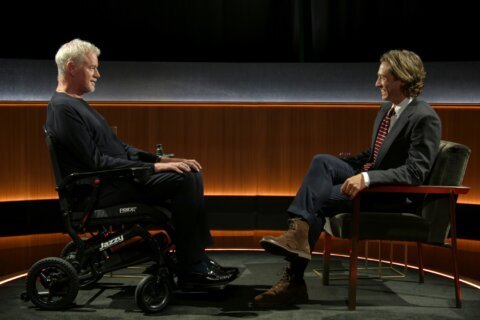Hear our full conversation on my podcast “Beyond the Fame.”
The Grammys on the Hill Awards returns to The Hamilton in D.C. on Wednesday night.
This year honors the prolific songwriting and producing duo Jimmy Jam and Terry Lewis.
“We thought it was probably a mistake and didn’t know what they were thinking, but we’re honored,” Jam told WTOP. “I’ve been a part of Grammys on the Hill for quite a few years and know the great work that goes on and great honorees that’ve been there in the past.”
Previous honorees include Alicia Keys, Keith Urban, Zac Brown Band and Little Big Town.
Each year, celebrity musicians turn out to salute the honorees with live performances.
“We have a whole lot of musical friends over 40 years of producing and writing songs,” Jam said. “There’s a nice group of people to choose from. It will be a beautiful evening.”
In addition to celebrating music, the event also promotes music advocacy on Capitol Hill.
“There’s a whole infrastructure of producers, engineers, songwriters and people behind the scenes that get affected adversely in the economic system of music,” Jam said. “Streaming royalties are particularly important. … Over COVID, the live music business really suffered … not only the people on the marquee, but all the technicians, sound and lighting people.”
This year’s ceremony will honor Rep. Ted Deutch (D-Fla.) and Rep. Michael McCaul (R-Texas) for co-sponsoring such legislation as the American Music Fairness Act.
“The United States is one of a handful of countries in the entire world where artists don’t get paid anything when their songs are played on the radio,” Rep. Deutch told WTOP. “We need to go back and make this work for today’s modern technology and the age we live in.”
McCaul is also the lead sponsor of the PEACE Through Music Diplomacy Act.
“Our bill recognizes the important role musicians play in promoting peace,” McCaul said. “It authorizes State Department exchange programs that bring young music artists together.”
It’s the rare cause to actually bring lawmakers together to work across the aisle.
“Music is bipartisan,” Jam said. “I always look at it as a quilt: different colors, different ages, Democrats, Republicans, people that maybe don’t even speak the same language around the world, but music is the universal language. As soon as you put a song on, you watch people’s heads nod at the same time. … Music is the thing that brings us together.”
We’ve all been brought together the music of Jimmy Jam and Terry Lewis.
The Minneapolis teens met in junior high in 1973, but were never actually classmates. Instead, they met during a summer program on the University of Minnesota campus.
“Jimmy and I were in a program called Upward Bound,” Lewis told WTOP. “When I first saw Jimmy, he was on a piano in the lunchroom swooning a bunch of girls. I was like, ‘Ah man, that’s a cool dude. I gotta get to know him.’ He says that when he first saw me, I had a red, black and green bass sitting on my bed in my dorm room playing.”
That summer, they formed a short-lived band called The Wars of Armageddon.
“That’s probably what we sounded like,” Lewis said. “It was dissonant, I’m sure.”
After the summer campus visit, they went their separate ways back to their different high schools to form two rival bands. Lewis rocked out in Flyte Tyme, which famously became The Time as Morris Day joined in 1981 to tour with Prince as his dynamic opening act.
“It was a lot of fun, some great musicians, great athletes as well,” Lewis said. “Jimmy’s main group was Mind & Matter, who we used to go up against sometimes in Battles of the Bands. … We were always competitive and friendly. Whenever we did something musically in studio, I would always ask Jimmy to come over and lend his skills to our records.”
Eventually, they decided to team up as record producers and songwriters, including Janet Jackson’s breakthrough album “Control” (1986) with catchy radio hits like “Nasty.”
“I remember meeting Janet,” Jam said. “Janet was a huge Morris Day & The Time fan, so she came to our show. … Her dad said, ‘You guys are from Minneapolis. … Don’t have my daughter sounding like Prince!’ … When Janet came to do ‘Control,’ it was great because it was her story of a young woman striking out on her own. Lyrically we told that story.”
The follow-up album, “Rhythm Nation 1814” (1989), was an all-timer with four No. 1 hits.
“We were at a restaurant having dinner, Sly & The Family Stone came on, the song ‘Thank You,'” Jam said. “We were like, ‘Oh, wait!’ We ran out of the restaurant … went straight to the studio, took the Sly sample, looped it with a drumbeat and played it for Janet. I just remember a smile just coming over her face. She just said, ‘Is that ‘Rhythm Nation?'”
In addition to future Jackson albums — “Janet” (1993), “The Velvet Rope” (1997) and “All For You” (2001) — Jam & Lewis also wrote Boyz II Men’s “On Bended Knee” (1994).
“The guys were on the final stages of completing their album and asked our opinion,” Lewis said. “We said, ‘You need a begging song.’ They laughed at us: ‘What do you mean by that?’ Jam started to play some chords and we came up with the concept of ‘On Bended Knee.’ … The execution by Boyz II Men is what’s so amazing. … They are the best.”
They also worked with Usher on his albums “8701” (2001) and “Confessions” (2004).
“I was at a point musically and production wise where I felt like a lot of artists were caught up on everything except music,” Lewis said. “Along comes this young kid Usher, he wants to work, he’s like a sponge, asking questions, trying things. … It really reinvigorated my whole concept of what music and production meant. I really have to thank him for that.”
Now, they’ve released the first album of their own: “Jam & Lewis: Vol. 1” (2021).
“We used to be like the doctors that would deliver the baby; now we have to take the baby home with us and actually feed it, change the diapers … that’s really the difference between being an artist and being just the writers and producers,” Jam said. “We assembled our family to do it: Usher, Boyz II Men, Morris Day & The Time, Mary J. Blige.”
When music history is written, what do they hope is their legacy?
“Michael [Jackson] asked us, ‘How do you guys want to be remembered? … Most No. 1 records?’ … I said, ‘No, those are statistics. … We want to be remembered as nice guys,'” Jam said. “A year later, we called Michael … and he said, ‘Can I tell you something? Every time people ask what it was like working with you, I just say, ‘They’re the nicest guys.'”
Hear our full conversation on my podcast “Beyond the Fame.”








